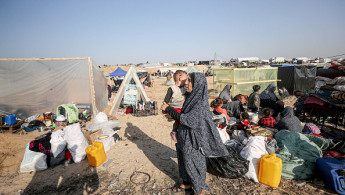Gaza's residents 'exhausted' as brutal Israel war, siege rage on amid increasing death toll
Fighting raged Saturday across Gaza, where displaced Palestinians said they were "exhausted" with no end in sight to the war in the besieged territory's waged by Israel, now in its 13th week.
Smoke billowed over the Gaza Strip's southern city of Khan Younis, the focus of recent fighting in the grinding war, which was triggered by Hamas attacks on Israel on October 7.
Further south, the border city of Rafah near Egypt was teeming with Gazans seeking safety from Israel's relentless bombardment in its fight against Palestinian militants.
"Enough with this war! We are totally exhausted," said Umm Louay Abu Khater, 49, who had fled her home in Khan Younis, taking refuge in Rafah.
"We are constantly displaced from one place to another in cold weather," she said. "The bombs keep falling on us day and night."
The Israeli army kept up its campaign in the face of mounting international pushback, reporting "fierce battles" and air strikes across Gaza.
Prime Minister Benjamin Netanyahu said Saturday that Israel's war against Hamas will last for "many months" - until the Palestinian militant group has been eliminated.
"We will guarantee that Gaza will no longer pose a threat to Israel," he told a news conference, adding that the military was involved in a "complex fight" and needed time to achieve its goals.
Israel's military campaign in Gaza has killed at least 21,672 people since October 7, mostly women and children.
Israel has also gone on to impose a siege of the territory, barring the entry of food, fuel and water to Gaza's 2.3 million residents, amid growing concerns of famine and the spread of disease, which is likely to exacerbate the death toll.
A ministry statement on Saturday said 165 Gazans were killed over the previous 24 hours.
An AFP correspondent reported continuous shelling of Rafah and Khan Younis overnight, and the health ministry said "multiple" people had died in a strike on a house in Nuseirat refugee camp, in central Gaza.
Medics in Nasser hospital in Khan Younis said they were facing severe shortages.
"The hospital is receiving a lot more (patients) than its capacity, in fact we are functioning at 300 percent of our... capacity," doctor Ahmad Abu Mustafa said in footage shared by the World Health Organization (WHO).
"The beds are full and we are basically short on all sorts of medicine supplies."
The health ministry appealed to the international community for increased support, including assistance in evacuating patients.
The fighting has put 23 hospitals and 53 health centres out of service, while 104 ambulances have been destroyed, the ministry said.
In central Gaza's Zawaida, Palestinians pulled the body of a child from under the rubble after an Israeli strike.
"We pulled (out) nine martyrs, who were members of a very peaceful family. Two adjacent houses were targeted," said the area's civil defence director, Rami al-Aidi.
Ahmed al-Baz, a 33-year-old Palestinian displaced from Gaza City, said this year had been "the worst in my life".
"It was a year of destruction and devastation," he said in Rafah, surrounded by tents in a makeshift camp.
"We just want the war to end, and start the new year at home, with a ceasefire declared."
International mediators - who last month brokered a one-week truce that saw more than 100 hostages released and some aid enter Gaza - continue in their efforts to secure a new pause in fighting.
US news outlet Axios and Israeli website Ynet, both citing unnamed Israeli officials, reported that Qatari mediators had told Israel that Hamas was prepared to resume talks on new hostage releases in exchange for a ceasefire.
And a Hamas delegation was in Cairo on Friday to discuss an Egyptian plan proposing renewable ceasefires, a staggered release of hostages for Palestinian prisoners, and ultimately an end to the war, sources close to Hamas say.
Islamic Jihad, another armed group fighting alongside Hamas, said on Saturday that Palestinian factions were "in the process" of evaluating the Egyptian proposal.
A response will come "within days", the group's chief negotiator, Muhammad al-Hindi, said.
Asked about the negotiations on Saturday, Netanyahu said Hamas had been "giving all kinds of ultimatums that we didn't accept".
"We are seeing a certain shift (but) I don't want to create an expectation," he added.
As Netanyahu spoke, hundreds of relatives and supporters of the hostages demonstrated in Tel Aviv to keep up the pressure on his government to bring their loved ones home.
"The scariest thing in Gaza was to be forgotten," said former hostage Moran Stela Yanai, who was released during last month's truce.
Pro-Palestinian activists meanwhile hit out at Washington's announcement it had approved a $147.5 million sale of high-explosive artillery munitions to Israel, saying it was "clear evidence of the American administration's full sponsorship of this criminal war".
The Gaza war has intensified tensions across the region.
In the occupied West Bank, Israeli troops shot dead a Palestinian motorist at the entrance to the Fawwar refugee camp south of Hebron. The army said he had attempted to run down soldiers.
Israel has traded frequent cross-border fire with Lebanon's Hezbollah group. Early Saturday the army said it had carried out strikes on Syria in response to rocket fire.





 Follow the Middle East's top stories in English at The New Arab on Google News
Follow the Middle East's top stories in English at The New Arab on Google News


